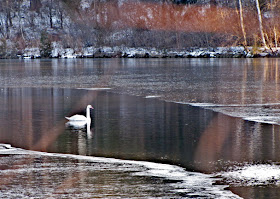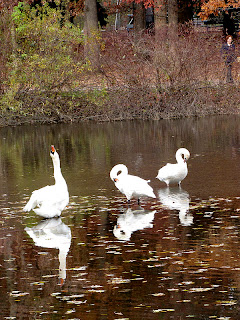A Hole In The Floor by Richard Wilbur
In case anyone has become interested in Richard Wilbur as a result of my last post, I’ll add some biographical info I’ve just stumbled onto. It’s written by Dana Gioia (JOY-uh), who, like Wilbur is a poet, teacher, translator, music scholar, and promoter of the arts.
Some specifics relevant to previous posts on Banjo52:
1. As a formalist poet, a graduate of Amherst and Harvard and teacher at Wesleyan, a translator of Moliere and composer of librettos, Wilbur might be thought an east coast elitist. In fact, his parents were of fairly modest (though somewhat intellectual) backgrounds.
2. During his college years, Wilbur spent two summers as a boxcar hobo.
3. Wilbur was in some major combat in World War II, partly because his leftist politics in college made him suspicious to superiors and got him transferred out of Army Intelligence into the infantry.
4. His work (and his own bias?) made him compatible with the New Criticism, which favors formalist, brainy poetry.
5. He had a long friendship with Robert Frost.
I remain partial to New Critical thinking about the limited role, if any, in reading authors’ lives into their writing. I don’t think any of Gioia’s information is essential to understanding or appreciating or critiquing Wilbur’s poetry; a writer’s life can be interesting in its own right, without our insisting upon reading it into the work.
As for the poetry itself, here is a 1962 take on Wilbur by eminent critic and important minor poet, Randall Jarrell, who often writes more colorful generalizations than he has time to support or illustrate completely. In that way, and in sparking us toward thought, whether in agreement or enraged disagreement, Jarrell reminds me of William Logan, though Jarrell might be less vitriolic, at least on Wilbur:
“Petronius spoke of the 'studied felicity' of Horace’s poetry, and I can never read one of Richard Wilbur’s books without thinking of this phrase. His impersonal, exactly accomplished, faintly sententious skill produces poems that, ordinarily, compose themselves into a little too regular a beauty – there is no eminent beauty without a certain strangeness in the proportion; and yet 'A Baroque Wall-Fountain in the Villa Sciarra' is one of the most marvelously beautiful, one of the most nearly perfect poems any American has written, and poems like 'A Black November Turkey' and 'A Hole in the Floor' are the little differentiated, complete-in-themselves universes that (sic) true works of art. Wilbur’s lyric calling-to-life of the things of this world – the things, rather than the processes or people – specializes in both true and false happy endings, not by choice but by necessity; he obsessively sees, and shows, the bright underside of every dark thing.”
 But you probably came here for a poem, not just commentary. So here again is “A Hole in the Floor." Notice the way Wilbur begins with rhyme and half-rhyme, then loses it in the middle stanzas. (But be on the lookout for rhyme and other sound play that's internal, rather than coming only at ends of lines).
But you probably came here for a poem, not just commentary. So here again is “A Hole in the Floor." Notice the way Wilbur begins with rhyme and half-rhyme, then loses it in the middle stanzas. (But be on the lookout for rhyme and other sound play that's internal, rather than coming only at ends of lines).A Hole In The Floor by Richard Wilbur
I think that struggle to find rhyme implies and echoes the dangerous chaos and darkness Wilbur sees just below the level where we think we live. Yet the return to exact, rather conspicuous rhyme in the final stanza might well suggest the kind of happy ending Jarrell refers to.
















